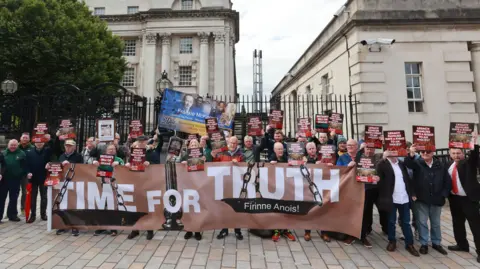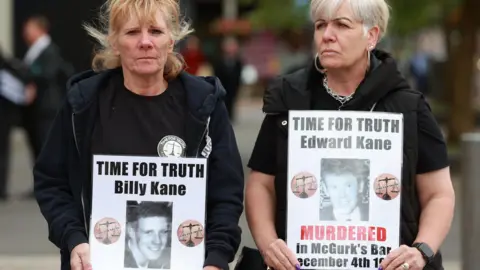‘Every victim entitled to an inquest should get it’

 Liam McBurney/PA
Liam McBurney/PA
Labour is being urged to fulfil its pledge to scrap the government’s controversial Troubles Legacy Act if it wins the general election.
This comes as the government begins its appeal against a ruling which found that parts of the act were unlawful.
The most contentious aspect of the act was an offer of conditional immunity to suspects in exchange for information about Troubles-era crimes.
Speaking outside court on Tuesday, Martina Dillon, whose husband was shot dead in a paramilitary attack in 1997, urged Labour to scrap the act should it come to power.
In February, the High Court in Belfast ruled such an amnesty would be in breach of the European Convention on Human Rights.
Families bereaved in the Troubles, who had welcomed February’s ruling, are still seeking to have other parts of the Legacy Act struck out.
Relatives gathered outside the Court of Appeal on Tuesday.
Among them was campaigner Ms Dillon, who called for access to fresh inquests – which was removed under the terms of the Legacy Act – to be reinstated.
“Every victim that’s entitled to an inquest, they should be getting it, it shouldn’t have been taken away,” she told reporters.
“The government brought on this law to suit themselves, not the people that it involves.”
On a visit to Belfast last year, Labour leader Sir Keir Starmer said he would repeal the Legacy Act if he became prime minister.
Ms Dillon said she had “confidence” that a future Labour government would honour that pledge.
“I have no other choice, I have to trust them,” she said.
‘Right this historic wrong’

 PA Media
PA Media
Ms Dillon’s call was echoed by Amnesty International’s deputy director in Northern Ireland, Gráinne Teggart.
“The next UK government has the opportunity to right this historic wrong,” she said.
“They must immediately, as an urgent legislative priority, repeal the Troubles Act and put in place victim-centred processes that prioritise victims and not perpetrators.”
Ms Teggart explained that Tuesday’s hearing was still significant as the families are continuing to challenge other aspects of the legislation.
She said this included the “human rights compliance” of the body which was set up by the act to run new investigations into Troubles killings and serious injuries.
The Independent Commission for Reconciliation and Information Recovery (ICRIR) is led by former lord chief justice of Northern Ireland, Sir Declan Morgan.
The ICRIR took over all Troubles-era cases from 1 May 2024, including those on the desk of the Police Services of Northern Ireland (PSNI).
Ms Teggart said Amnesty still had “significant concerns” about the the ICRIR.
“We need Article 2 compliant investigations so that victims can finally get truth and justice for their loved ones,” she said.

 Liam McBurney/PA
Liam McBurney/PA
Opening the appeal on Tuesday, government barrister Tony McGleenan summarised a number of previous unsuccessful attempts to deal with the legacy of the Troubles since the Good Friday Agreement was signed in 1998.
Mr McGleenan argued that perpetrators of conflict-related crimes offered conditional amnesties under the legislation could still face prosecution.
“If it’s not earned, the criminal justice process remains intact,” he said.
He added that it is “about fidelity to the core principles of the Belfast Agreement, particularly that of reconciliation”.
The government’s appeal is seeking to overturn the significant defeat it suffered at the High Court in February.
At that time Mr Justice Colton struck out a central element of the Legacy Act, which would have offered perpetrators of Troubles’ offences conditional immunity.
He ruled it was incompatible with the Windsor Framework and the European Convention of Human Rights.
On the same grounds, he also disapplied the section of the act which banned new civil cases.
A cross-appeal is also being mounted by relatives of victims over another part of the ruling.
February’s ruling found the ICRIR had sufficient independence and powers to investigate Troubles-related cases.
The Labour Party has said it would not immediately scrap the ICRIR, as it wanted to see if it could command the confidence of victims’ families.
What is the Legacy Act?


The Northern Ireland Troubles was a 30-year conflict that cost more than 3,500 lives and left thousands more seriously injured.
Last year’s Northern Ireland Troubles (Legacy and Reconciliation) Act was the government’s controversial attempt to “draw a line” under that conflict.
It was first proposed by the then prime minister Boris Johnson in 2021 as a solution to ending what he called “vexatious prosecutions” of former soldiers.
The act become law in 2023 and under its initial terms:
- suspects were in line to be offered immunity from prosecution if they cooperated with new investigations into Troubles-era crimes
- all Trouble-related inquests which had not reached the stage of findings were shut down on 1 May 2024
- new civil cases relating to Troubles-era events could not be lodged in court after the May deadline
- the Independent Commission for Reconciliation and Information Recovery (ICRIR) was formed to examine Troubles deaths and serious injuries
The act’s most contentious element – the offer of conditional immunity to suspects – was disapplied by the High Court in February, as was the bar on new civil cases.

 Liam McBurney/PA
Liam McBurney/PA
There has been widespread opposition to the Legacy Act.
Several victims’ groups; all of Northern Ireland’s political parties, the Labour Party and the Irish government criticised it from the start.
They argued that it denies justice to the bereaved and the injured.
Last December, the Irish government launched a legal challenge over the act in the European Court of Human Rights.
However the UK government has argued that the act is human rights compliant.








